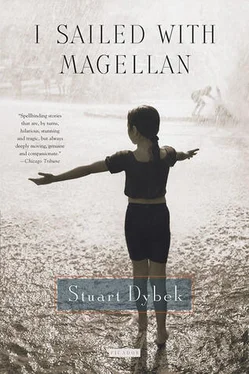“Probably not home yet,” Stosh said. “She got a job working at a bakery.”
He sorted through the flowers on the backseat until he found the one he wanted, then crossed the street, climbed the stairs, and fit an orchid into the handle of the storm door.
“No note?”
“She’ll know who,” he said and took off as if we were making a getaway. “Hey, we’re on a roll. How about an orchid run to Bus Girl’s?”
I looked at our mud-caked jeans, at Stosh’s missing shoe; despite the elation we were riding, it sounded impossible.
“Nah, I’m dying of thirst,” I said, which was true.
“So let’s go celebrate. I got a couple cervezas tucked in the fridge.”
The sudden idea of seeing Laurel again after thinking about her continually since prom night made me feel as if I’d just taken a hit of speed. In my daydreams, I planned on calling her when I got back from Mexico with something pretty I’d bought for her — I didn’t know exactly what — something you could only get in Mexico. We splished down Twenty-fourth Place, our windows open to the spray as the Merc windshield-wipered through the car wash of an erupting hydrant. I tossed an orchid to a little girl wading in the flooded gutter. We turned onto Rockwell, cruising along the truck docks and factories, and as we passed the block length of Spiegel’s warehouse I noticed a shift of women filing out of work.
“Hold up,” I yelled, and Stosh braked and double-parked before the employee entrance. I scooped up an armful of flowers and squeezed between the parked cars into the group of women.
“Who’s that wild-looking bouquet for, honey?” a poker-faced redhead with a hillbilly accent asked.
“Ladies, good afternoon!” I announced. “The Management of Spiegel’s has declared this Women Workers’ Day and asked me to distribute these tokens of appreciation. This is for you,” I said, presenting the redhead an orchid.
“Why thanks, sugar,” she said, cracking a smile, then gave me a peck on the cheek.
“And this is for you and you and one for you,” I repeated, handing out flowers. They mobbed around me, laughing and kidding and popping gum. Another group of women filed out the door and came over to see what was going on.
“What you giving away, boy? Ooooh, cool!” one of them exclaimed.
“Plenty more where these came from, ladies,” I said, handing over the last of my flowers.
A driver in a semi stuck behind the Merc was leaning on the horn. I could see Stosh gesturing to me.
“Sorry, gotta run,” I said.
“Bye-bye!” The ladies waved. “Thank you, thank you!”
I climbed in, and we shot away as if propelled by the horn blasts of the enraged trucker.
“You’re giving away all the profits, man!” Stosh laughed.
I looked in back. The pile had been diminished. “There’s still plenty, and we can go back and get more.”
“I guess a little free advertising never hurt. You probably could have sold them. See what I mean? There was mass orchid madness, an orchid feeding frenzy. I thought they were going to gang-rape you.”
“Hey! I think I might have found my calling: the Orchid Man!”
“All right, Orca Man, let’s go get a brew.”
“Yeah, and we better get the rest of these in water.” I could almost feel their thirst. I could visualize them in a vase of cool water — a tall, clear vase on a bureau beside the bed in Laurel’s room. Sunlight filtered through her sheer curtains and the glass of the vase. She’d wake and the flowers would be the first thing she saw. I didn’t know how I’d sneak them in there, but she’d rise wondering who left the flowers and go to the mailbox and it would be full of orchids, too. There’d be orchids fit into the knocker of her door, stuffed in keyholes, scattered over her front steps, clipped like parking tickets under the windshield wipers of her mother’s Olds. And if I didn’t have enough flowers for all that there were more along the river, growing out of the ooze, surrounded by the drone of insects and songs of birds, still undisturbed, secret.
We were riding down Twenty-sixth, and what was left of the day had come alive. Shoppers whirled from the revolving doors of department stores; mariachi music blared out of bars; at stands under awnings outside groceries, women were breaking bunches of plantains from green stalks; on the corner of Spaulding, a vendor scooped black seeds from freshly sliced papayas. There was the fragrance of tacos and cabrito smoldering on spits. The street names were in English, but the rest of Twenty-sixth read like a Spanish lesson: Frutería, Lavadero, Se Habla Español. I repeated the signs to myself, practicing, and when I noticed the Mayan features of an old woman whom Stosh had stopped to allow to cross the street, it suddenly was clear, in a way it had never been before, that whether I got there or not, Mexico had already come to me.
We parked on Stosh’s street in the rubble lot beside his two-flat.
“Tecate!” he said, to the refrain of “Tequila.” He carefully gathered up the remaining orchids from the backseat.
“They keep them in a cooler at the florist,” I said. “You think we should put them in the fridge?”
“I don’t know. My old man might think they’re a salad and eat them.”
I picked up a couple he’d dropped and did an Orchid Man dance with them down the gangway to the rear of the house.
“Oh no, the fucken Orkin Man is getting carried away again,” Stosh said.
Even before we climbed the back stairs to the kitchen, I could smell the coffee wafting through the screen door and hear the women’s voices.
The kitchen was full of women dressed as though it was Sunday. They were sitting around the kitchen table, sipping coffee and nibbling the remains of the devil’s food cake that Stosh’s mother served on the afternoons when she hosted Tupperware parties. This party looked nearly over: ashtrays piled with lipsticked butts, countertops lined with half-empty Tupperware bowls of dip and chips. All shapes and sizes of Tupperware were displayed on card tables in the dining room, where the formal presentation had been. I recognized a few of the women from the parish: Mrs. Lalecki, whose son, Larry, had dropped out of grade school when Stosh and I went there; Mrs. Sosa, who led the choir at St. Roman and whose son, Hector, had been paralyzed by a bullet in a gang shooting; Mrs. Corea, who got up once during a sermon and denounced the priests as Svengalis after her beautiful daughter, Lima, insisted on joining the Carmelites; Mrs. Martoni, who once, wearing only a slip, was locked out of the house in the dead of winter by her drunken husband. Along with the other women, they’d spent the afternoon at the Tupperware party, and we’d barged in on their confidential conversation.
“Excuse us,” Stosh said, giving me a Groucho look that I knew meant the beer is trapped. He stood there sweaty, shirtless, covered in dried mud, holding the flowers as if delivering a bouquet.
“You boys want some cake?” Stosh’s mother asked. “Stanley, where’s your shoe?”
“We could use a Tupperware vase for these,” Stosh said.
“What you have there?” one of the ladies asked.
“Orchids,” Stosh said.
“Orchids don’t grow around here,” Mrs. Lalecki said authoritatively.
“Yeah, that’s what they all say,” Stosh told her, nodding a look at me and shaking his head condescendingly. “So, what do you call these?”
“Irises,” Mrs. Corea said.
“What do you mean irises?” Stosh said, flushing suddenly the way I’d seen him do in fights. “They’re orchids.”
“Stanley, sweetie, they’re irises,” his mother said. “I got them growing in the back yard.”
Читать дальше












